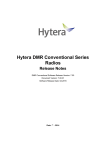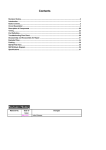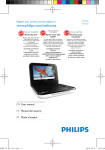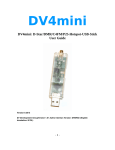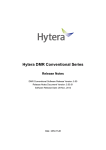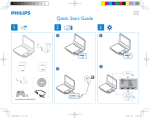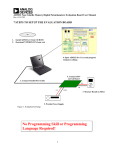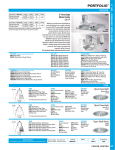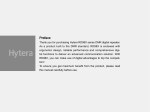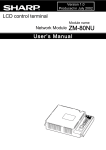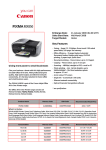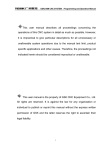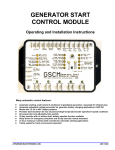Download Hytera DMR Conventional Series Release Notes - HAM
Transcript
Hytera DMR Conventional Series Release Notes DMR Conventional Software Version: 6.00 Release Notes Version: 6.00.02 Software Release Date: 31-03-2014 Date: 31-03-2014 Copyright Information Hytera is the trademark or registered trademark of Hytera Communications Co., Ltd. (the Company) in PRC and/or other countries or areas. The Company retains the ownership of its trademarks and product names. All other trademarks and/or product names that may be used in this manual are properties of their respective owners. The product described in this manual may include the Company’s computer programs stored in memory or other media. Laws in PRC and/or other countries or areas protect the exclusive rights of the Company with respect to its computer programs. The purchase of this product shall not be deemed to grant, either directly or by implication, any rights to the purchaser regarding the Company’s computer programs. Any of the Company’s computer programs may not be copied, modified, distributed, decompiled, or reverse-engineered in any manner without the prior written consent of the Company. Disclaimer The Company endeavors to achieve the accuracy and completeness of this manual, but no warranty of accuracy or reliability is given. All the specifications and designs are subject to change without notice due to continuous technology development. No part of this manual may be copied, modified, translated, or distributed in any manner without the express written permission of us. If you have any suggestions or would like to learn more details, please visit our website at: http://www.hytera.com. Revision History Version Release Date Description R6.00.02 2014.03.31 Second Release Software Version R6.0 since a new firmware version V6.00.07.005 released to replace the previous version V6.00.07.004 R6.00.01 2014.01.27 Release Software Version R6.0 R5.05.02 2013.09.30 Optimize and fix problems for certain customers. See the context in red. R5.05.01 2013.08.15 Release Software Version R5.5 R5.00.01 2012.12.03 Release Software Version R5.0 R4.05.01 2012.02.29 Release Software Version R4.5 R4.01.01 2011.11.23 Release Software Version R4.1 with corresponding RDAC. R4.00.02 2011.10.20 Release delay due to RDAC modification R4.00.01 2011.09.15 Initial release. Note Contents 1. Product Version ..........................................................................................................................4 2. What’s new in this release? ...................................................................................................... 5 2.1 What’s new in release R6.0 for subscriber? ........................................................................ 5 2.1.1 New Enhancement ...............................................................................................5 2.1.2 New Features ........................................................................................................ 9 2.2 What’s new for Repeaters in R6.0? ...................................................................................11 2.2.1 Optimization for Repeaters in R6.0.................................................................. 11 2.2.2 New Features ...................................................................................................... 12 2.3 What’s new in release R6.0 for Tools? .............................................................................. 14 2.3.1 New Enhancement .............................................................................................14 2.3.2 New Features ...................................................................................................... 14 3. Important Notes ........................................................................................................................15 3.1 Radio ................................................................................................................................. 15 3.1.1 Software ............................................................................................................... 15 3.1.2 Hardware ............................................................................................................. 15 3.2 Repeater ............................................................................................................................16 3.2.1 Software ............................................................................................................... 16 3.2.2 Hardware ............................................................................................................. 16 3.3 Tools .................................................................................................................................. 17 3.3.1 Software ............................................................................................................... 17 3.4 Accessories ........................................................................................................................18 4. Issue........................................................................................................................................... 19 4.1 Issue Abstract ....................................................................................................................19 4.2 Solved Issues of Previous Version......................................................................................19 5. Appendix.................................................................................................................................... 20 1. Product Version DMR Products Subscriber (Portable/Mobile) Repeater Customer Programming Software (CPS) Software Versions A6.00.07.005 S6.00.07.005 A6.00.05.004 S6.00.05.004 V6.00.05.012 Repeater Diagnostics And Control V6.00.01.010 (RDAC) Tuner V6.00.01.005 USB_Driver_V2.01.01.008.eng (for 32 USB Driver bits operation system) DMR_SW_usb_driver_V5.30.42.0 ( for 64 bits operation system)* Note: *If the customer would like to use 64 bit operation system in their PC, we recommend customer to upgrade the radio into a firmware version higher than R5.0 and then use the USB driver DMR_SW_usb_driver_V5.30.42.0 2. What’s new in this release? 2.1 What’s new in release R6.0 for subscriber? 2.1.1 New Enhancement - Phone Interconnect Enhancement Base on the early version of Phone Interconnect, the follow features have been added to Phone Interconnect: 1. Phone Gateway ID: The radio will display phone call when receiving a call from this ID; 2. Buffer Dial Contact Name: Sets the TX contact name for buffer dial. CPS configuration path: Phone -> Phone System -> Phone Gateway ID Phone -> Phone System -> Buffer Dial Contact Name Channel Steering Enhancement Base on the early version of Channel Steering, the follow features have been added to Channel Steering: 1. Channel Steering 6 has been added. If the Channel Steering List is not enabled, the channel will be switched within a range of 1 – 16 in the current zone. 2. After the Channel Steering List is configured and enabled via CPS, you can switch the channel within a range of 1 – 63 via the Channel Steering List. This feature is available for mobile radio only. CPS configuration path: General Setting -> Accessories -> GPIO Pins -> Pin# -> Channel Steering General Setting -> Accessories -> Channel Steering List -> Channel Steering List Enable - Alert Call Enhancement Base on the early version of Alert Call, the follow features have been added to Alert Call: 1. Multiple Alert Calls is allowed. The radio will display the ID or alias of the first Alert Call, then the radio will only display the number of Alert Call received. 2. The Alert Call will be saved into Missed Call. You can press “View” to access the Missed Call menu directly. In the Missed Call menu, select an Alert Call and hold down the PTT key to call back. CPS configuration path: DMR Services -> Basic -> Alert Call Decode - Priority Interrupt Enhancement In the early version of Priority Interrupt, this feature can be configured only after Slot Operation is set to Pseudo Trunk via CPS. In this version, the requirement is not needed any more. CPS configuration path: Channel -> Digital Channel -> Priority Interrupt Encode/Decode - Telemetry Enhancement Send Text Message Only is added to Telemetry. You can use this feature to send only text message excluding VIO status information. The receiving radio will display the message content directly. CPS configuration path: General Setting -> Telemetry -> Action - Rx Group List Optimization When Rx Group Including Tx Contact is enabled, if the Tx contact of a channel is a Group Call contact not listed in the Rx Group List of that channel, the radio can still receive group call from this Group Call contact. CPS configuration path: DMR Services -> Basic -> Rx Group Including Tx Contact - Group Call Vibration After the Group Call Vibration is configured via CPS, the radio will give vibration alert when receiving a group call. CPS configuration path: General Setting -> UI Indication -> Vibration -> Group Call Vibration - User-defined Vibration Menu This menu allows you to configure the vibration duration, vibration cycles and vibration interval of Private Call, Group Call, Text Message and Alert Call without CPS. CPS configuration path: General Setting -> Menu -> Common Menu -> Settings -> Radio Settings -> Vibration - Password Screen Alert Tone After the Radio Password is set and Radio Lock is enabled via CPS, you need to input the pass word to power up the radio. If there’s no operation for a preset time (about 20 seconds), the radio will give an alert tone. This feature is available for radios with display only. CPS configuration path: Common -> Setting -> Password -> Radio Lock Common -> Setting -> Password -> Radio Password - Configuration no program channel to Zone You can add no program channel into the channel list in a zone via CPS per actual need. CPS configuration path: Zone -> Channel List -> Members - Scan Status Backup When the radio is powered off normally during scanning, it will make a backup of the scan status. The radio will start scanning automatically when it is powered on again. Note: Normal power-off means powering off the radio via Power-On/Off Knob. The radio will not make a backup of the scan status if it is powered off due to abnormal situations (such as battery detaching or power failure). CPS configuration path: General Setting -> Setting -> Miscellaneous -> Scan Backup - Encrypt Key Edit You can edit and save the Key ID, Key Alias, Key Length and Key Value of a certain key via the menu. Note: If Multiple Key Encryption Decoding or Random Key Usage in Encryption is enabled for the current channel, the radio cannot access the Encrypt Key List. CPS configuration path: General Setting -> Menu -> Common Menu -> Settings -> Radio Settings -> Encrypt -> Encrypt Key List - Radio Auto Wake Up when Power Recovered When the radio cannot be powered on or is powered off due to low voltage, it will be powered on automatically when the battery voltage meets the following requirement. This feature is available for portable radio only. Auto Wake Up Voltage 7V - ACC TK Adding You can configure the ACC TK with programmable feature via CPS. This feature is available for X1 series and PD6XX radios. CPS configuration path: General Setting -> Accessories -> GPIO Pins -> Pin#11 -> ACC TK General Setting -> Buttons -> ACC TK Note: the ACC TK is for the remote speaker microphone for X1 series and PD6XX series. For specific accessory, users should go to the user manual for specific definition. - CTCSS Range Expand The CTCSS range of the analog channel which can be set via CPS is expanded from 67-254.1Hz to 67-255Hz. CPS configuration path: Channel -> Analog Channel -> CTCSS - 64 Emergency Systems The number of emergency systems has been increased form 16 to 64 for you to deal with more emergency situations. CPS configuration path: Emergency -> Digital Emergency - 64 Rx Group List Members The number of Rx Group List Members has been increased from 16 to 64 for you to set more Rx Groups. CPS configuration path: DMR Services -> RX Group List -> Members - Non-display Model Supports 1024 Channels The number of channel has been increased from 32 to 1024 for radios without display. Radios without display include PD60X, MD65X, PD70X, PD71XEx, X1e, etc. CPS configuration path: Channel -> Digital Channel/Analog Channel Note: with this enhancement, users could configure up to 1024 channels which will be available in the channel list. Then they could add to the needed channels into the zone list for communication. The radios without display still support 3 zones and max.16 channels in each zone - Inform Peripheral when Radio Disabled The radio will inform the connected peripheral equipments via third party development protocol when it is disabled, and the peripheral equipments can make corresponding operation. This feature is available for third party development protocol in R1.50 Peripheral Equipment ADK. (Please contact your local dealer or us for more information about Third Party Development Protocol) CPS configuration path: DMR Services -> Basic -> Radio Disable/Enable Decode - Data Service Retry Times Increased Third parties can configure the retry times of data services (such as Message, Telemetry, Data Transfer, User-defined Data) via air interface per actual need. This feature is available for Third Party Development Protocol in R2.60 PC ADK (Please contact your local dealer or us for more information about Third Party Development Protocol) 2.1.2 New Features - Compandor This feature can provide better voice quality for analog channel and can be configured via CPS or menu operation. This feature is available for Analog Channel only. CPS configuration path: Channel -> Analog Channel -> Compandor General Setting -> Menu -> Common Menu -> Settings -> Radio Settings -> Compandor - Radio Block After the Radio Block feature is enabled via CPS, when the times you enter wrong CPS Read/Write Password exceeds the preset tries, the radio will be blocked. You have to obtain a License from your local dealer to unblock the radio. CPS configuration path: Common -> Setting -> Password -> Radio Lock Note: The universal password to unlock the radio has been cancelled since R5.5. If the radio is blocked, in R5.5, users could use the feature “reset default data” in CPS configuration path: Program -> Reset Default Data. In R6.0, users could apply for a license or use the feature “reset default data” to unlock the radio - Position Query This feature can query the distance and location of another radio. The querying radio must be a radio with display and keypad supporting the Positioning feature; the queried radio must be a radio with Positioning feature. CPS configuration path: General Setting -> Menu -> Common Menu -> Accessories -> Position Query - BT Audio Switch You can program the programmed BT Audio Switch key via CPS. When the BT device is connected, you can press this key to switch the speaker type between the BT speaker and main radio speaker. CPS configuration path: General Setting -> Button -> BT Audio Switch - One Touch Menu After the One Touch Call/Menu key is configured, you can press this key to access the preset menu directly. CPS configuration path: General Setting -> Buttons -> One Touch Call/Menu General Setting -> One Touch Call/Menu -> Type -> Menu - Japanese Menu Japanese menu is available, which is subject to the language packages the radio loaded. (Please contact your local dealer for more information about the language packages) - Telephone Style Handset The MD78X mobile radios support telephone style handset, with which you can control the mobile radio. (Please contact your local dealer for more information) - Digital Audio Access (PCM/AMBE) This feature allows the third party to receive and transfer digital audio data via further development interface. The data decode format includes PCMA, PCMU, RAW PCM, AMBE and SELP. Please refer to the API protocol (R1.50 Peripheral Equipment ADK) for more information. (Please contact your local dealer or us for more information about Third Party Development Protocol) - UART to IP Base on the early USB and UART feature, the UART to IP feature is added to API. This feature is for trial only currently and will be released in later version. Please refer to the API protocol (R2.60 PC ADK) for more information. (Please contact your local dealer or us for more information about Third Party Development Protocol) Note: This feature is for mobile DMR radios including MD7 series and MD6 series 2.2 What’s new for Repeaters in R6.0? 2.2.1 Optimization for Repeaters in R6.0 - Configurable Repeater operating voltage (RD98X/RD98XS) For some district, the power which the customers supply is not eligibility for the repeater. The voltage of the power supply cannot reach the voltage range of the repeater needed. When the repeater supplied by utility power, the range of the voltage is 11-15.6V. The voltage of the power supply is lower than 11V, the repeater will shut down the Tx module; when the power supply is in the range of 11-12V, the repeater’s power output is limited between 0 to 30W; when the power supply is in the range of 12-14.6V, the repeater works normally; when the power supply is in the range of 14.6-15.6V, the repeater’s power output is limited between 0 to 40W; when the power supply is over 15.6V, the repeater will shut down the Tx module. This feature allow the customers configure the voltage range of the repeater’s power supply to 10-15.6V. The voltage of the power supply is lower than 10V, the repeater will shut down the Tx module; when the power supply is in the range of 10-12V, the repeater’s power output is limited between 0 to 30W; when in the range of 12-15.6V, it’s same to the utility power supply. CPS Configuration Path: Conventional -> General Setting -> Setting -> Basic Setting -> Battery Mode - RSSI Signal Output via Pin The RSSI signal in the current channel can be configured to be output via Pin#26. When in digital mode, the output RSSI signal is the slot which configured in the selected channel, when in analog mode, the output RSSI is the selected channel. The repeater output the RSSI signal through the power voltage via Pin#26. Please refer to the appendix about the corresponding of RSSI signal to the power voltage. CPS Configuration Path: Conventional ->Channel ->Digital Channel -> Slot Operation - Contact Switch via Pin The Tx contact of the selected channel can be selected from the contact list via 4 or less pins. You can select the top 15 contact in the contact list for Tx contact of the selected by changing the active level of the pins. When Pins are not configured or the active level of the pins is invalid, the Tx contact will be the contact of the selected channel. CPS Configuration Path: Conventional -> General Setting -> Accessories -> GPIO Pins - Remote PTT Detect This feature allows the remote PTT action of the repeater been output via pins. When PTT action is detected, the level will change (PTT is on : Active level; PTT is off: Inactive level), so as to inform the third party device of PTT action. Note: When the path priority of the repeater is configured to repeat request, the repeater is on repeating status, repeater will not response to the third party device’s PTT request, the remote PTT detect will not output anything. CPS Configuration Path: Conventional -> General Setting -> Accessories -> GPIO Pins - TX Slot Switch The TX Slot can be switch by change of active level of the pins. When holding down the PTT key, the radio will transmit in another slot. When the active level recovers, the TX Slot will be switched back to the preset slot. CPS Configuration Path: Conventional -> General Setting -> Accessories -> GPIO Pins 2.2.2 New Features - SNMP Communication Protocol This feature supports general network management protocol, which allows you to develop network management software per actual need. (If you need to develop your own network management software, please contact your local dealer for the SNMP API document “Hytera-Repeater-MIB R1.0.smi”) CPS configuration path: Conventional -> General Setting -> Network -> SNMP -> SNMP Trap IP - SIP Phone gateway 2 simultaneous calls Base on SIP protocol, the interconnection between DMR radio network and Public Switched Telephone Network (PSTN) has been realized. A communication between radios, repeaters, IPPBX devices and PSTN phone can be established via SIP protocol. The phone can call all the private and group call ID which is registered in the IPPBX, not just only the Tx contact ID which configured in the selected channel. SIP phone supports 2 simultaneous calls. In the SIP Phone system, one IPPBX device can support the interconnection between multiple repeaters and PSTN network; besides PSTN, it can support the interconnection between dispatch station and IP phone. (Please contact your local dealer for more information about SIP Phone application notes) CPS configuration path: Conventional -> Phone -> Phone System -> Phone System Conventional -> Phone -> Phone System -> Group Phone Call - Info Hidden Menu You can hide the information of the repeater via this menu to ensure the network security. CPS Configuration Path: Conventional -> General Setting -> Menu - Repeat Gain You can configure the Repeat Gain feature for analog mode per actual need via CPS. This feature allows the repeater repeats the receiving signal after amplified; it can enhance the quality of the voice in the area where the signal is weak or attenuated badly. CPS Configuration Path: Conventional -> General Setting -> Setting -> Basic Setting -> Repeat Gain - AIS Third Party Development Protocol AIS Third Party Development Protocol is developed according to DMR Association definition, aiming to enhance the compatibility of third party application between DMR Standard devices and save the third party application development cost. (Current version is the trial release. Please contact your local dealer or us for information about the formal release) CPS configuration path: Conventional -> General Setting -> Network -> Application Programming Interface 2.3 What’s new in release R6.0 for Tools? 2.3.1 New Enhancement - Clone Optimization This optimization can skip the ID of HDC1200 in the clone between radios, which can prevent call failure due to same ID. 2.3.2 New Features - Repeater Diagnostics and Control (RDAC) (SNMP) RDAC developed on the basis of SNMP Protocol (general standard protocol) has been added to provide you with more options. The customer can select the SNMP or HRCP protocol by configuring the connection mode of RDAC, USB and IP Multi-site connection sis based on HRCP protocol, and the SNMP connection is based on SNMP protocol. Note: SNMP general network protocol can only be used for device management in local area network due to inherent limitation. (Please contact your local dealer for more information) 3. Important Notes 3.1 Radio 3.1.1 Software 1. The CTCSS range in R6.0 has been extended to 67-255Hz. You can configure the radios with lower firmware version via CPS R6.0. But when you configure the radios via CPS of lower version, the CTCSS range is still 67-254.1Hz. 2. HD radios have deleted in R6.0. For sold HD radios, if it is upgraded using R6.0 firmware upgrade package, it will be forcibly changed to corresponding PD radio. 3. Radio Block feature has been added in R6.0 to ensure the safety of the customer configuration. When a radio is blocked, you must provide the serial number of the radio to acquire the authorized license from the Company to unblock the radio. 3.1.2 Hardware 1. New models 1). Release MD65X UHF1 2). Release PD75X VHF/UHF1 2. New frequency 1). Release MD78X VHF 1W 2). Release PD60X VHF (Please contact your local dealer for more information) 3.2 Repeater 3.2.1 Software 1. From R6.0 and above version, Compressed IP Data Encrypt strategy has been optimized to encrypt certain user data content instead of all the data, and it is not compatible with the same feature of previous versions. For radios to use the features based on the optimized Compressed IP Data from DMR association, please guarantee all the radio is in R6.0 or above. 3.2.2 Hardware Newly supported radio models in R6.0: (Please contact your local dealer for more information) Model V RD62X Yes U1 U2 U3 3.3 Tools 3.3.1 Software 1. Authorized License Tool has been developed for radio unblocking application. 2. Note: Customer Programming Software and Tuner can be operated in 64 bits operation system. 3. RDAC developed on the basis of SNMP protocol can only be used for device management in local area network due to inherent limitation. 3.4 Accessories None 4. Issue 4.1 Issue Abstract The following table lists the solved serious issues from R5.5 to R6.0. (Serious issues indicate issue may cause material impacts on customers) 4.2 Solved Issues of Previous Version No. Product Description #18241 Subscriber When data transfer service is set to compressed IP, if the radio in R6.0 sends telemetry command to radio in R5.5, the radio in R6.0 will display successful message sending, but the radio in R5.5 gives on indication on VIO status. #16460 Subscriber The visibility issue of CPS R5.6 causes that the parameters of certain radios are not hidden. #17127 Subscriber Quick GPS feature of Compass radios is not functioning and radios do not report the Quick GPS data. #16012 Subscriber After the MIC AGC is enabled manually, the Audio Feedback Suppression feature cannot be enabled manually. #16767 Subscriber There is an excess Battery menu in Radio Setting of PD79X, but PD79X does not support anti-fake battery. 16931 Repeater The voice will be discontinuous if the receiving signal output of the repeater is not continuous during repeating. 16712 Repeater When the color codes are not consistent, the radio can activate the repeater if Knockdown feature is enabled. 16805 Repeater When the Monitor feature is enabled via the pins, the repeater cannot enable the Monitor feature after it switches to a non-scanning channel from a scanning channel. 16830 Repeater When RD96X and RD62X repeaters are disabled, the repeaters will restart if they are called by portable radios for certain period of time. 16833 Repeater RD62X repeater can still repeater and transmit when it is in Low Voltage or High Voltage alarm. Receiving disconnection will occur when it is in High Voltage alarm. 5. Appendix 1. The corresponding of RSSI to power voltage: RD62X: RSSI DB26 active level (V) -57 3.337 -58 3.306 -59 3.274 -60 3.242 -61 3.212 -62 3.18 -67 3.021 -72 2.894 -77 2.735 -82 2.577 -87 2.419 -92 2.26 -97 2.102 -102 1.944 -107 1.785 -112 1.595 -117 1.469 <-122 1.342 RD96X: RSSI DB26 active level (V) -57 3.384 -62 3.226 -67 3.006 -72 2.907 -77 2.748 -82 2.590 -87 2.431 -92 2.272 -97 2.113 -102 1.954 -107 1.796 -112 1.637 -117 1.447 -122 1.383 <-122 1.067 RD98X/RD98XS: RSSI DB26 active level (V) -57 3.173 -58 3.142 -59 3.112 -60 3.112 -61 3.081 -62 3.052 -67 2.901 -72 2.750 -77 2.600 -82 2.449 -87 2.299 -92 2.149 -97 1.998 -102 1.848 -107 1.697 -112 1.546 -117 1.426 -122 1.332 <-122 1.005 2. The following table is the model with 1PPS on R6.0: Model Name Model Number PD700-000G00PL-M00000-V1-0-B PD700-000G00PL-000000-V1-0-B PD700-000G00PL-M00000-U1-0-B PD70XG PD700-000G00PL-000000-U1-0-B PD700-000G00PL-M00000-U2-0-B PD700-000G00PL-000000-U2-0-B PD700-000G00PL-M00000-U3-0-B PD700-000G00PL-000000-U3-0-B PD700-000R00PL-000000-V1-0-B PD700 Glonass PD700-000R00PL-M00000-V1-0-B PD700-000R00PL-000000-U1-0-B PD700-000R00PL-M00000-U1-0-B PD700S PD700-00SG00PL-M00000-U1-0-B PD780-000G00PL-M00000-V1-0-B PD78XG PD780-000G00PL-000000-V1-0-B PD780-000G00PL-M00000-U1-0-B PD780-000G00PL-000000-U1-0-B PD780-000G00PL-M00000-U2-0-B PD780-000G00PL-000000-U2-0-B PD780-000G00PL-M00000-U3-0-B PD780-000G00PL-000000-U3-0-B PD780-000G00PL-M00000-U6-0-B PD780-000R00PL-000000-V1-0-B PD780 Glonass PD780-000R00PL-M00000-V1-0-B PD780-000R00PL-000000-U1-0-B PD780-000R00PL-M00000-U1-0-B PD780-000C00PL-000000-V1-0-B PD780-000C00PL-M00000-V1-0-B PD780 Compass PD780-000C00PL-M00000-U1-0-B PD780-000C00PL-000000-U1-0-B PD780-000C00PL-M00000-U5-0-F PD780-000C00PL-M00000-U3-0-B PD750-000G00PL-000000-U1-0-B PD750-000G00PL-M00000-U1-0-B PD75XG PD750-000G00PL-000000-U2-0-B PD750-000G00PL-M00000-U2-0-B PD750-000G00PL-000000-V1-0-B PD750-000G00PL-M00000-V1-0-B PD880-000G00PL-000000-U1-0-B PD880L PD880-000G00PL-M00000-U1-0-B PD880-000G00PL-000000-V1-0-B PD880-000G00PL-M00000-V1-0-B PD880-000C00PL-000000-U1-0-B PD880 Compass PD880-000C00PL-M00000-U1-0-B PD880-000C00PL-000000-V1-0-B PD880-000C00PL-M00000-V1-0-B MD780-000G00P0-000000-V1-H-F MD780-000G00P0-000000-V1-L-F MD780-000G00P0-000000-U1-H-K MD780-000G00P0-000000-U1-L-K MD78XG MD780-000G00P0-000000-U2-H-K MD780-000G00P0-000000-U2-L-K MD780-000G00P0-000000-U3-H-K MD780-000G00P0-000000-U3-L-K MD780-000G00P0-000000-U6-H-K MD780-000G00P0-000000-U6-L-K MD780-000R00P0-000000-V1-H-F MD780 Glonass MD780-000R00P0-000000-V1-L-F MD780-000R00P0-000000-U1-H-K MD780-000R00P0-000000-U1-L-K MD78X 1W MD78XG MD780 Compass MD780-000G00P0-000000-V1-A-F MD780-000G00P0-000000-U6-H-K MD780-000G00P0-000000-U6-L-K MD780-000C00P0-000000-U3-L-K MD780-000G00PD-000000-V1-H-B MD78XG_D MD780-000G00PD-000000-V1-L-B MD780-000G00PD-000000-U3-H-A MD780-000G00PD-000000-U3-L-A MD65XG MD650-000G00P0-000000-V1-A-A MD650-000G00P0-000000-U1-A-C X1e0X-000G00P0-MB0000-U1-0-F X1e0X-000G00P0-MB0000-U2-0-F X1e0X-000G00P0-MB0000-U3-0-F X1 X1e00-000G00P0-MB0000-U6-0-F X1p0X-000G00P0-MB0000-U1-0-F X1p0X-000G00P0-MB0000-U2-0-F X1p0X-000G00P0-MB0000-U3-0-F PD600-000G00P0-M00000-Um-0-C PD600-000G00P0-N00000-Um-0-C PD60XG PD600-000G00P0-100000-Um-0-C PD600-000G00P0-M00000-V1-0-A PD600-000G00P0-N00000-V1-0-A PD600-000G00P0-100000-V1-0-A
























